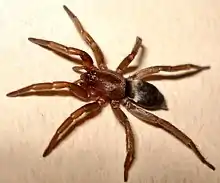Scotophaeus blackwalli
Scotophaeus blackwalli, also known as the mouse spider, is a species of spider belonging to the family Gnaphosidae.
| Scotophaeus blackwalli | |
|---|---|
 | |
| Scientific classification | |
| Domain: | Eukaryota |
| Kingdom: | Animalia |
| Phylum: | Arthropoda |
| Subphylum: | Chelicerata |
| Class: | Arachnida |
| Order: | Araneae |
| Infraorder: | Araneomorphae |
| Family: | Gnaphosidae |
| Genus: | Scotophaeus |
| Species: | S. blackwalli |
| Binomial name | |
| Scotophaeus blackwalli (Thorell, 1871)[1] | |
It is a ground spider and does not create webs. Instead it hunts for insects and other spiders at night and uses its enlarged spinnerets to produce a sticky silk to subdue its prey. It is also an opportunistic scavenger.
Females also use their silk to build protective nests for their eggs.[2]
Description
The adult males of these spiders reach 9mm in length, maturing in the early summer, while females reach 12mm, and can be found until autumn.[3][4][5]
The carapace is dark brown while the abdomen is brown/grey with hairs resembling the body of a mouse, hence the common name of 'mouse spider'.[4] The legs are brown with thick pubescence.[4] The male has a small scutum on the dorsum of the abdomen.[3]
Distribution and habitat
Scotophaeus blackwalli is native to Europe, the Caucasus, Turkey and Iran. It has been introduced to North America, Peru, and Hawaii.[1] It is commonly found around and inside houses in Britain, usually in the Autumn, and also under bark and in holes in walls in warmer parts of Europe.[4] It hunts nocturnally.[5]
Subspecies
- Scotophaeus blackwalli isabellinus (Simon, 1873) — Corsica, Italy, Croatia
- Scotophaeus blackwalli politus (Simon, 1878) — France
References
- "Taxon details Scotophaeus blackwalli (Thorell, 1871)", World Spider Catalog, Natural History Museum Bern, retrieved 2016-04-15
- https://usaspiders.com/scotophaeus-blackwalli-mouse-spider/
- Roberts, Michael J. (1996) Collins Field Guide - Spiders of Britain and Northern Europe, Collins, ISBN 978-0-00-219981-0, pp. 108-9
- Jones, Dick (1989) A Guide to Spiders of Britain and Northern Europe (revised edition), Hamlyn, ISBN 0-600-56710-9, p. 74
- Savory, Theodore (1945) The Spiders & Allied Orders of the British Isles, Warne, p. 64